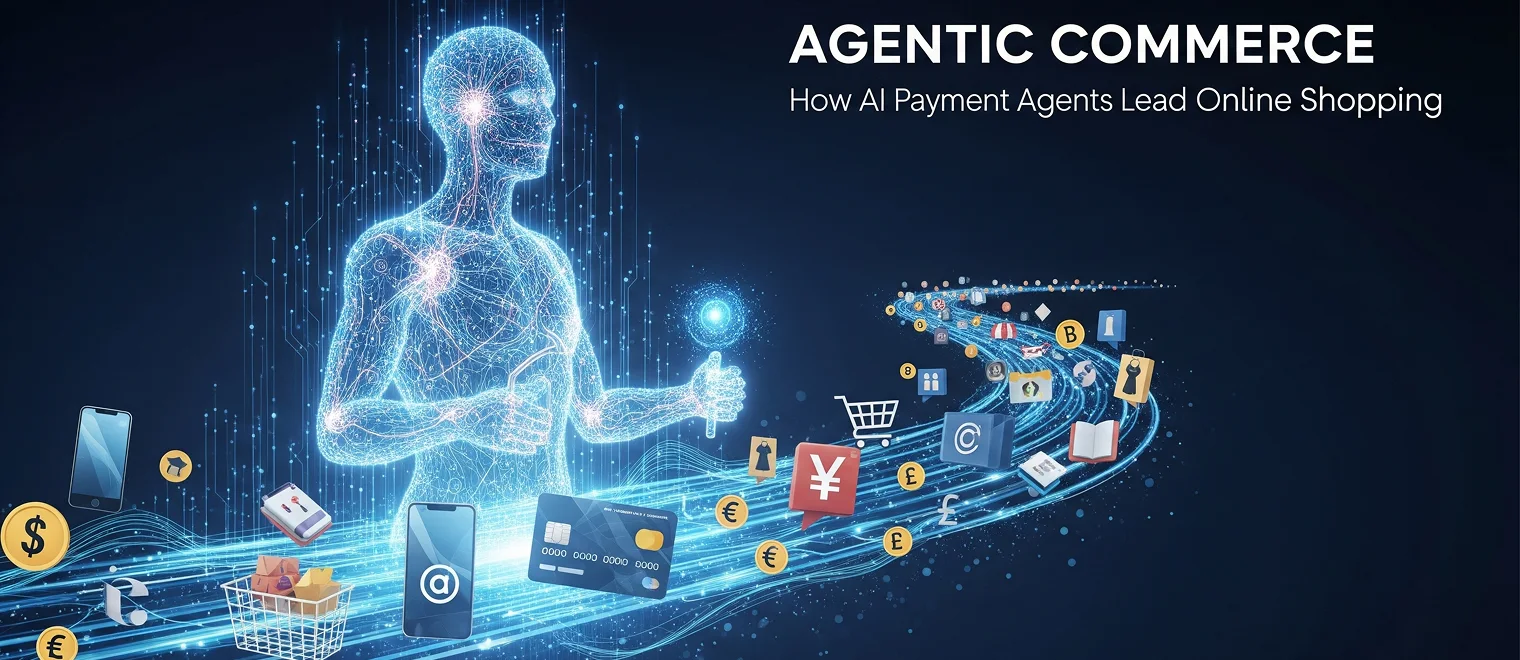Introduction: The Future of Payments is Here
In today’s hyper digital economy, shoppers expect speed, trust, transparency, and security in payments with zero friction and instant confirmation. Yet businesses face growing challenges around fraud prevention, data privacy, and governance.
This is where agentic commerce emerges, the next frontier of AI powered digital transactions. At its core are AI payment agents that research, compare, and securely execute purchases in real time, powered by biometric passkeys, secure tokenization, and modern payment orchestration.
For consumers, it delivers frictionless checkout, personalized shopping experiences, and secure checkout across devices. For enterprises, it drives operational efficiency, higher conversion rates, and marketplace growth opportunities. Supported by innovators like Visa, Mastercard, OpenAI, Amazon, Paypal and more. Agentic commerce is transforming online shopping, retail payments, and the digital economy.
Why Do We Need AI in Payments?
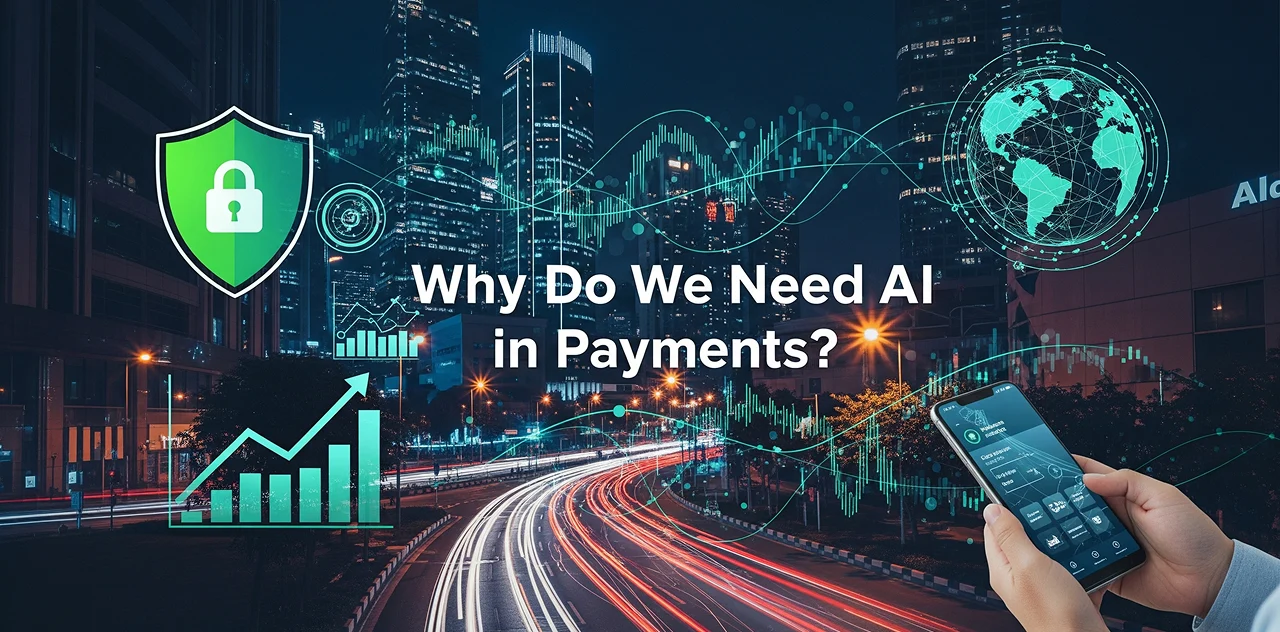
We need AI in payments because the traditional payment system is no longer enough to meet modern consumer expectations. Shoppers today demand zero friction, instant security, and personalized experiences, yet legacy systems rely on manual inputs, static authentication and outdated fraud checks. This creates unnecessary friction, higher cart abandonment rates, and increased exposure to fraud.
AI solves these problems by introducing autonomous intelligent agents that can:
- Execute in real time → Speed up approvals, manage authentication seamlessly, and reduce false declines.
- Ensure safer automation → Use secure tokenized credentials, algorithmic bias mitigation, and data privacy management to protect consumer trust.
- Enable shopping as delegation → Allow customers to set user defined parameters (“pay my bill under $500” or “book my flight with a change fee under $150”) while agents handle the rest.
- Support adaptive fulfillment & dynamic pricing strategies → Make smarter pricing and routing decisions based on inventory, promotions, and consumer behavior.
In short, AI-powered payment agents combine speed with governance, transparency, and security, turning payments from a painful step into a seamless, trust driven experience. For businesses, this shift means operational efficiency, competitive disruption navigation, and future readiness in the era of next-gen ecommerce.
From Assisted to Autonomous: The Shift in E-commerce
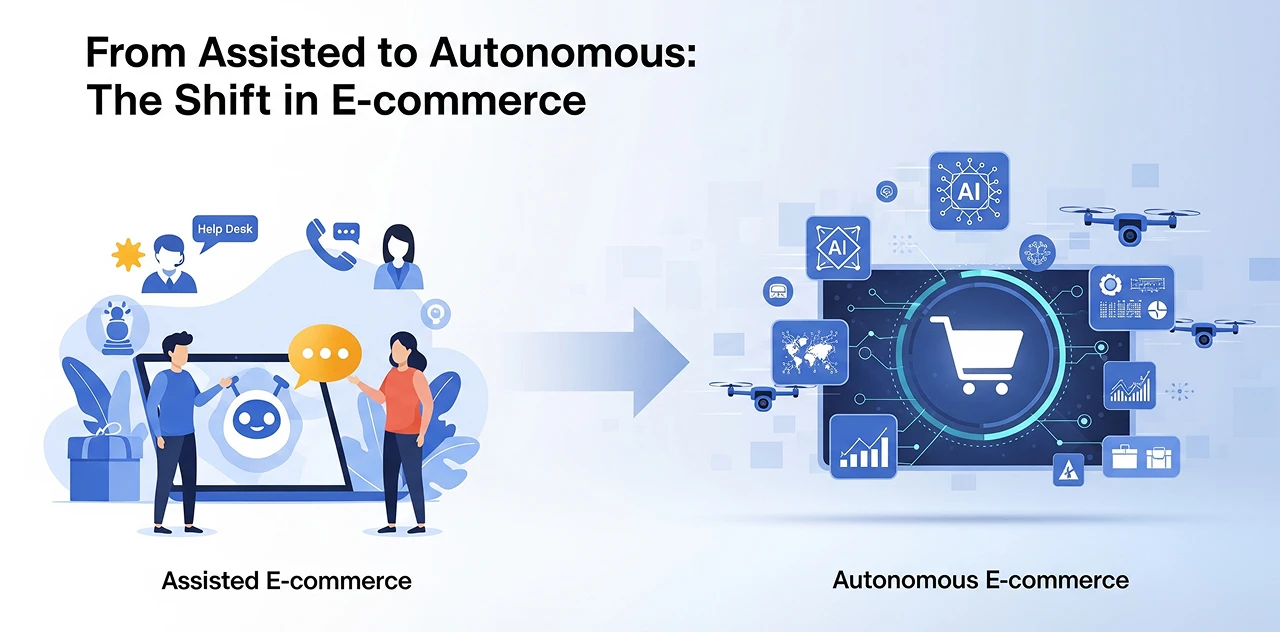
The fundamental transition is the shift from assisted to autonomous shopping. Instead of reactive chatbots, AI agents making purchasing decisions decisions work like a self-driving car, continuously analyzing real time data, applying dynamic pricing strategies, and delivering hyper personalization and insights driven recommendations.
Where traditional systems face static systems no longer sufficient, air-powered tools enable real-time orchestration and dynamic responsiveness across inventory management, demand forecasting, and promotions.
This is not futuristic speculation. Already, Perplexity’s one click shopping integration, Visa Intelligent Commerce, and Amazon’s AI powered Interests feature demonstrate how real world developments are embedding agent aware product visibility and AI enabled shopping delegation into consumer experiences.
What Is Agentic Commerce?
In simple terms, agentic commerce is when AI agents act on behalf of consumers to handle the entire shopping process, searching, comparing, recommending, and even transacting. Unlike traditional bots that only react, autonomous AI agents are proactive, intelligent, and orchestration capable, working much like a personal shopper who never sleeps.
The way people buy online is changing faster than ever. From zero click shopping experiences to AI agents making purchasing decisions on behalf of consumers, the future of e-commerce isn’t just about speed or personalization, it’s about delegation.
The term agentic commerce refers to the next evolutionary step in digital shopping, where AI agents autonomously research, compare, and complete transactions on behalf of consumers. Unlike traditional e-commerce that relies on user clicks and manual browsing, agentic ai tools shopping shifts toward ecom shopping as delegation.
In this paradigm, the new marketplace is not just a website or app but an ecosystem of AI driven commerce platforms, multi-agent systems, and AI shopping copilots operating across websites, messaging apps, CRM, Slack, mobile apps, and even voice over screen channels.
With transparency, governance, trust, and privacy as critical adoption drivers, businesses that embrace this shift will gain a competitive edge in the new buyer economy.
The Role of AI in Online Shopping
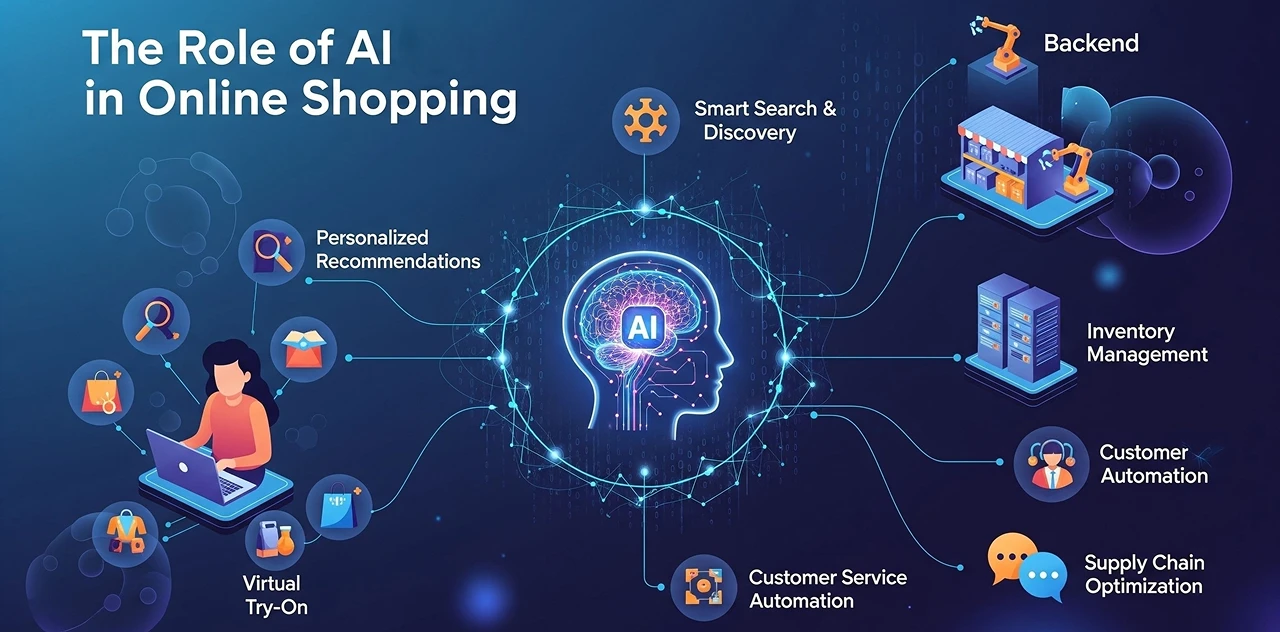
Artificial Intelligence (AI) has evolved from being a supporting tool to becoming the core engine of the next next generation of ecommerce solutions. Today, it powers personalized shopping journeys, seamless customer experiences, and intelligent fraud prevention systems.
By embedding AI into online shopping, retailers and businesses unlock smarter personalized product recommendations, secure payment orchestration, and adaptive checkout flows fundamentally reshaping how consumers engage with online marketplaces.
E-commerce leaders such as Amazon and Alibaba pioneered AI-driven platforms, proving that smart algorithms can boost conversion rates, operational efficiency, and customer experience at scale. Today, this innovation is evolving into autonomous commerce, where AI shopping agents go beyond recommendations to execute purchases, manage loyalty, and even optimize payments.
Key Contributions of AI in E-commerce:
- Hyper-personalized recommendations → By analyzing browsing behavior, purchase history, and contextual data, AI predicts shopper intent and delivers product suggestions that increase both satisfaction and sales.
- Frictionless customer service → AI chatbots and autonomous assistants are available 24/7 to answer queries, resolve payment issues, and guide shoppers reducing cart abandonment and support costs.
- Trust & security → With machine learning algorithms monitoring patterns in real time, businesses can detect fraud faster and ensure safer transactions, creating a more reliable payment experience.
For shoppers, this means faster discovery, personalized offers, and secure checkout. For enterprises, it translates into higher conversions, improved AOV (average order value), and sustainable competitive advantage in the online shopping economy.
Core Pillars of Agentic Commerce
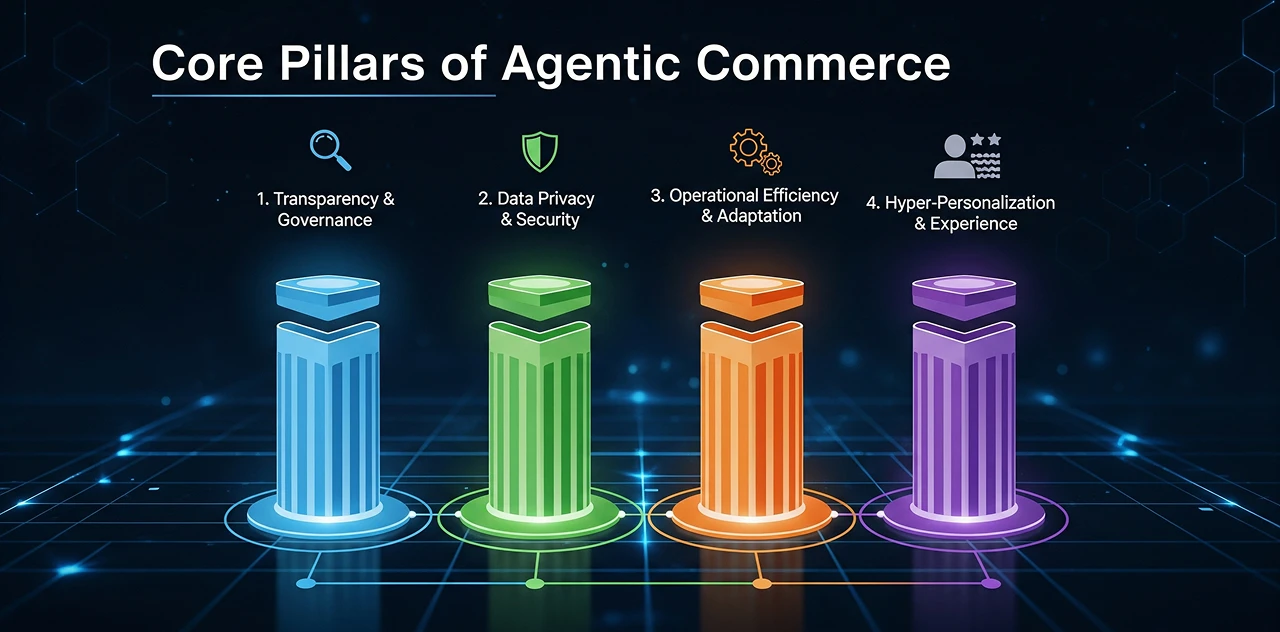
For businesses, success depends on four critical pillars:
1. Transparency & Governance
- Clear governance and design ethics.
- Transparency and consumer trust built into every process.
- Privacy preserving data models that safeguard user information.
2. Data Privacy & Security
- Secure tokenized credentials and Visa Payment Passkeys.
- Bank grade tools and guardrails for authentication.
- Fraud protection systems optimized for bot based buying.
3. Operational Efficiency & Adaptation
- Automating workflows (pricing, vendor onboarding, fulfilment).
- Adaptive fulfilment with real-time agility.
- Dynamic responsiveness to promotions, inventory, and customer needs.
4. Hyper-Personalization & Experience
- Insights driven recommendations.
- Balancing convenience with emotional “surprise and delight.”
- Reducing decision fatigue through AI-powered shopping journeys.
What is an AI payment agent?
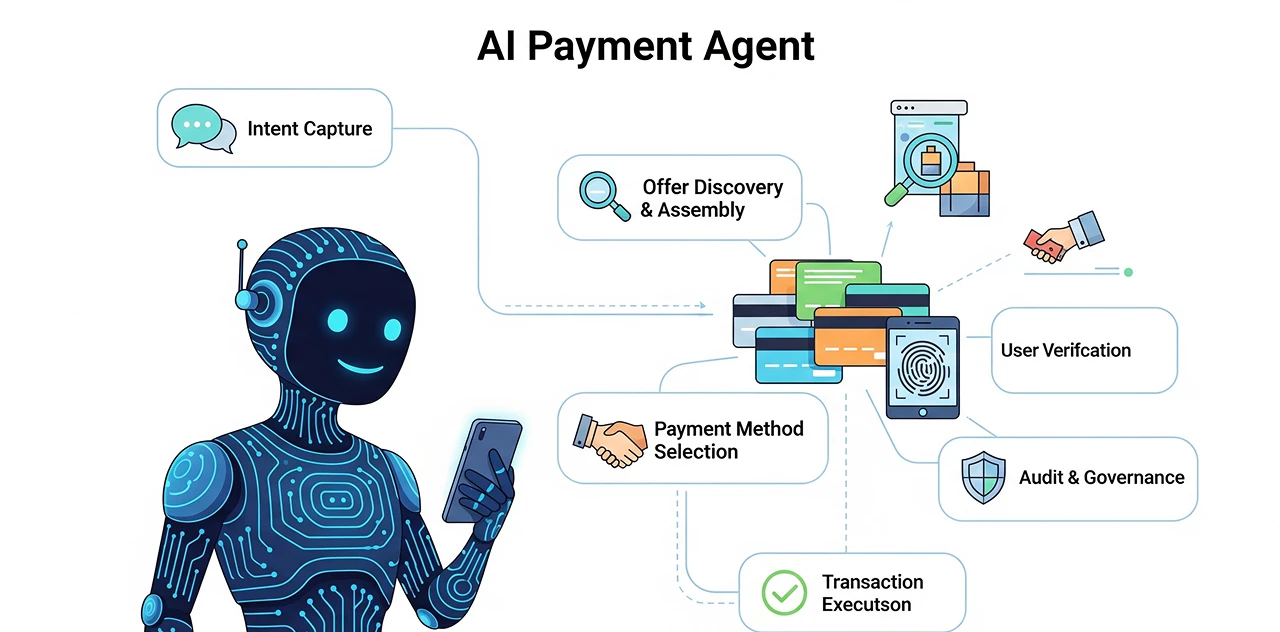
An AI payment agent is a specialized autonomous software agent authorized to initiate and complete payments on a customer’s behalf under clearly defined consent and policy controls. Unlike traditional checkout forms, these agentic AI tools handle the entire journey intelligently and securely.
Here’s how it works step by step:
- Intent Capture - Understands natural language commands (e.g., “book a hotel near downtown with a gym under $220/night”).
- Offer Discovery & Assembly - Fetches product listings or services, applies loyalty points, discounts, or coupons.
- Payment Method Selection - Chooses the most eligible, secure, or user preferred payment option.
- User Verification - Confirms consent using biometrics, passkeys, or multi factor authentication.
- Transaction Execution - Processes the purchase via a tokenized, secure payment gateway.
- Audit & Governance - Generates a consent trail, ensuring the flow is transparent, policy-compliant, and auditable.
🔑 Business impact: This creates a checkout experience that is frictionless, conversational, and contextual, yet far more secure, adaptive, and trust driven than traditional forms.
How Do AI Agents Work in Shopping?
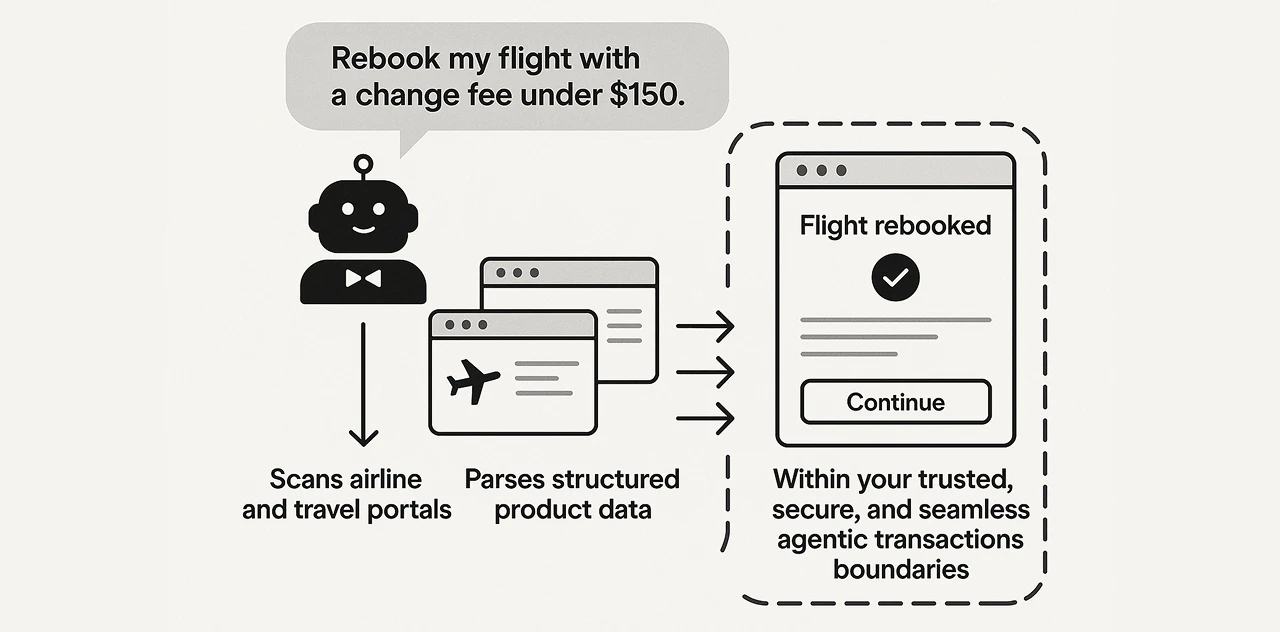
Imagine this:
You say, “Rebook my flight with a change fee under $150.”
- Scans airline and travel portals.
- Parses structured product data.
- Applies pricing optimization.
- Completes the booking
Within your trusted, secure, and seamless AI-powered transactions boundaries.
How Agentic Checkout Works: Architecture at a Glance
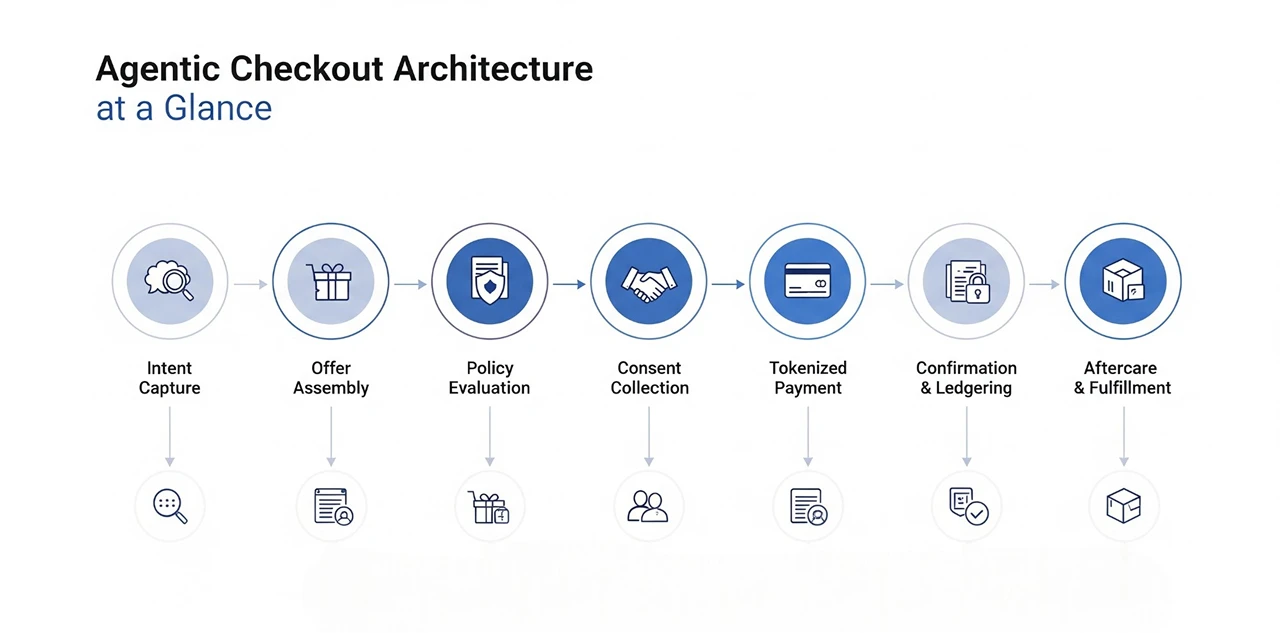
Agentic checkout isn’t just faster, it’s smarter, safer, and more transparent. Here’s how the full pipeline works step by step:
- Intent Capture → User states goal in chat, voice, or UI (natural language prompts).
- Offer Assembly → Agent queries catalogs, applies dynamic pricing, loyalty, and bundles.
- Policy Evaluation → Risk checks, spending limits, SCA/3DS triggers, and governance rules.
- Consent Collection → User approves via biometrics, passkeys, or tokenized authentication.
- Tokenized Payment → Agent submits secure payments through Visa, Mastercard, PayPal, or Stripe APIs.
- Confirmation & Ledgering → Receipts, webhooks, and transaction ledgers ensure compliance and transparency.
- Aftercare & Fulfillment → Refunds, partial captures, delivery updates, and omnichannel orchestration.
Core Architecture: How AI Agents Transform Shopping
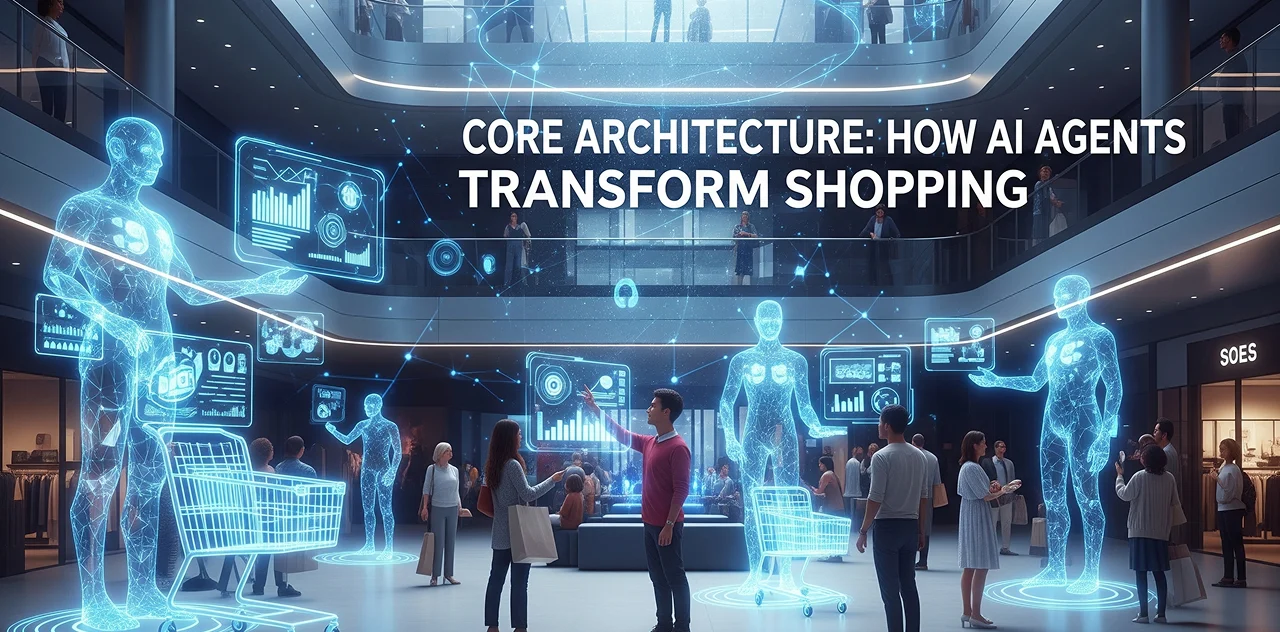
To understand the mechanics of ai-powered ecommerce, let’s look at its core architecture:
- Autonomous intelligence: AI agents anticipate needs, reduce decision fatigue, and execute with human aware oversight.
- RAG & Knowledge Graphs: Fueling retrieval augmented generation for product discovery, ensuring trusted multi source data for safer, bias free outcomes.
- Structured product data & machine readable catalogs: Enabling agent aware product and brand visibility.
- Secure-tokenized credentials & Visa Payment Passkeys: Ensuring trusted, secure, and seamless ai-powered transactions.
- AI Hub: Centralized control for scalable ai-powered operations, governance, and compliance (GDPR, CCPA, PCI DSS v4).
Unlike chatbots, autonomous intelligent agents are proactive orchestration systems that anticipate needs, interpret clarifying questions, and deliver hyper personalized shopping at scale.
How AI Payment Agents Work: A Simple Breakdown
Think of AI payment agents as intelligent digital guardians that handle transactions in three powerful steps:
Learn & Adapt
- Trained on vast transaction data, user behavior, and fraud patterns.
- Continuously evolves with machine learning to spot both normal and suspicious activity.
Analyze in Real Time
- Every transaction is checked instantly: location, device, history, and risk factors.
- Fraud attempts are flagged or blocked before they reach the checkout.
Protect with Encryption
- Sensitive data is encrypted during transmission and storage.
- Uses secure tokenized credentials and evolving protocols to outsmart hackers.
🔑 The result: fast, secure, and trustworthy transactions, where autonomous agents make smarter decisions in real time and ensure safer automation for both consumers and businesses.
How Agentic Commerce Transforms the Buyer Journey
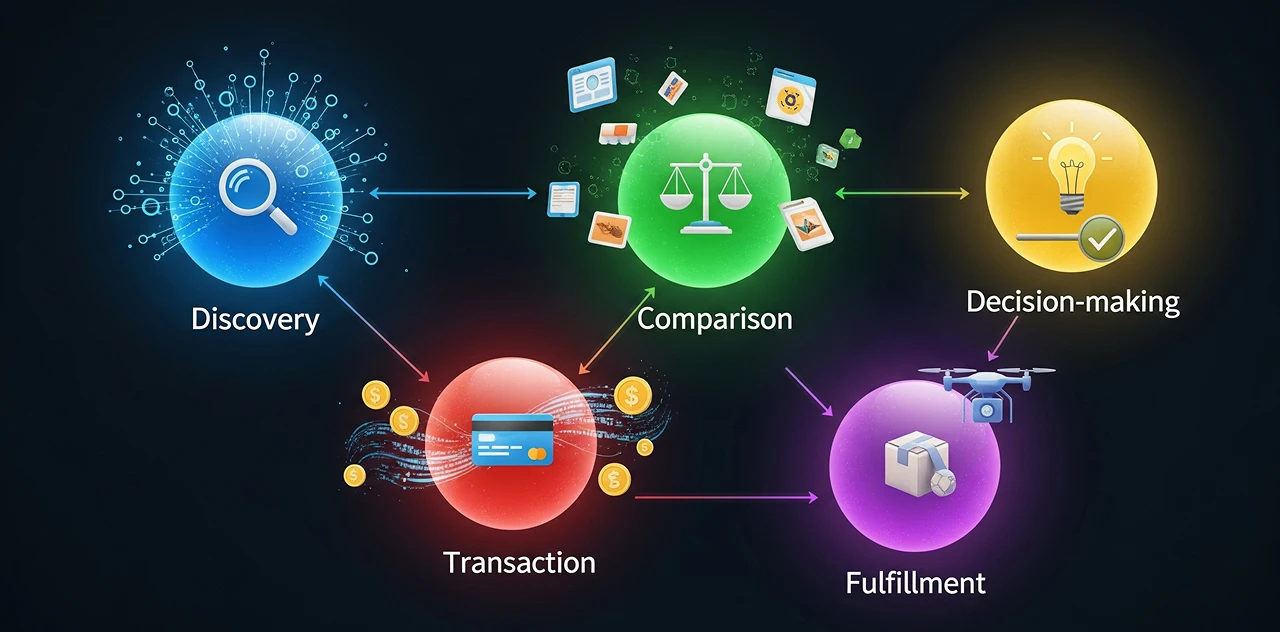
Here’s how consumer behavior shifts in an agentic marketplace:
- Discovery → AI enabled search tools interpreting natural language.
- Comparison → agents parsing structured product data, filtering SKUs, and applying dynamic pricing strategies.
- Decision making → autonomous AI agents handling negotiations.
- Transaction → trusted, secure, and seamless agentic transactions with consumer consent and control.
- Fulfillment → adaptive and scalable operations without extra human oversight.
For customers, an AI shopping assistant eliminates friction by streamlining product research, delivering personalized recommendations, and completing secure payments in a seamless flow.
🌟 The Impact of AI Payment Agents on Customer Experience
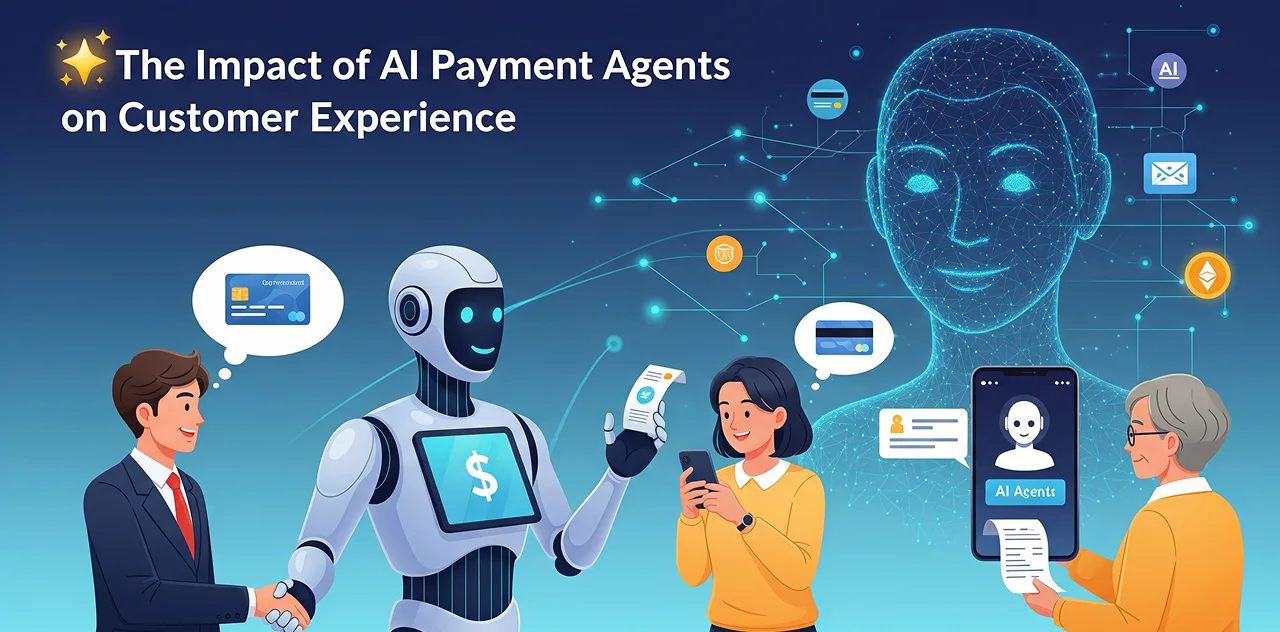
AI payment agents aren’t just about fraud prevention, they’re reshaping the shopping journey. Here’s how:
Frictionless Checkout
- Traditional payments = long forms + multiple verifications.
- AI agents enable zero click shopping experiences, auto fill credentials, and real time orchestration for instant payments.
Hyper-Personalized Interactions
- Uses data privacy compliant analytics to recommend payment methods, discounts, or loyalty rewards.
- Delivers customized promotions that feel personal, not generic.
Always-On Support
- Acts like a 24/7 digital assistant that answers queries, resolves payment issues, and explains authentication steps.
- Builds trust and transparency, reducing anxiety around online transactions.
Reduced Cart Abandonment
- Fewer clicks = less frustration.
- Fast, adaptive checkout leads to higher conversions and customer loyalty.
🔑 Takeaway: AI payment agents elevate e commerce from simple transactions to intelligent, enjoyable, and trust driven journeys.
Benefits of AI Payment Agents for Consumers
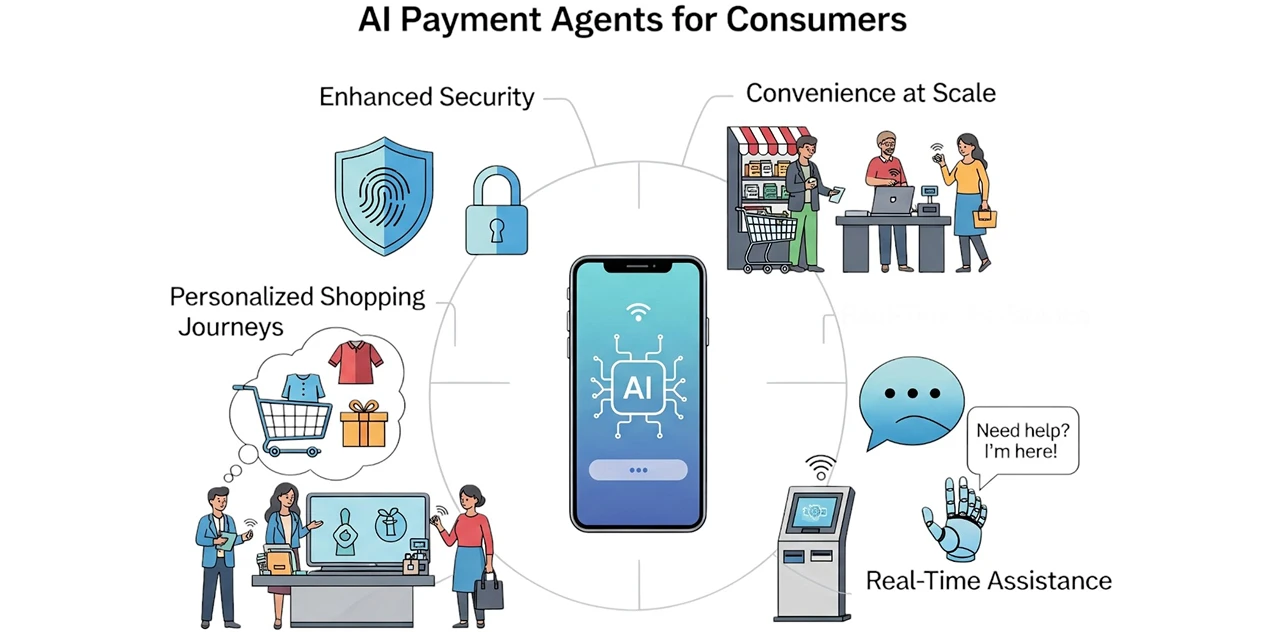
For shoppers, autonomous digital agents delivers both peace of mind and personal convenience:
Enhanced Security
- Monitors transactions with autonomous intelligent agents trained on fraud detection patterns.
- Uses biometric authentication + tokenization for safer payments.
Convenience at Scale
- Automated workflows like form filling and one tap confirmation simplify payments.
- Supports multi channel execution across apps, websites, and mobile wallets.
Personalized Shopping Journeys
- Offers AI driven recommendations based on behavior and context.
- Enables real-time dynamic pricing and personalized promotions for smarter autonomous ecommerce experiences.
Real-Time Assistance
- Delivers instant answers to payment queries.
- Improves customer experience (CX) by minimizing waiting times.
💡 Why it matters: Consumers gain trust, speed, and personalization, making seamless online shopping with AI not just secure, but delightfully effortless.
Business Benefits & ROI Metrics for Merchants and Product Teams
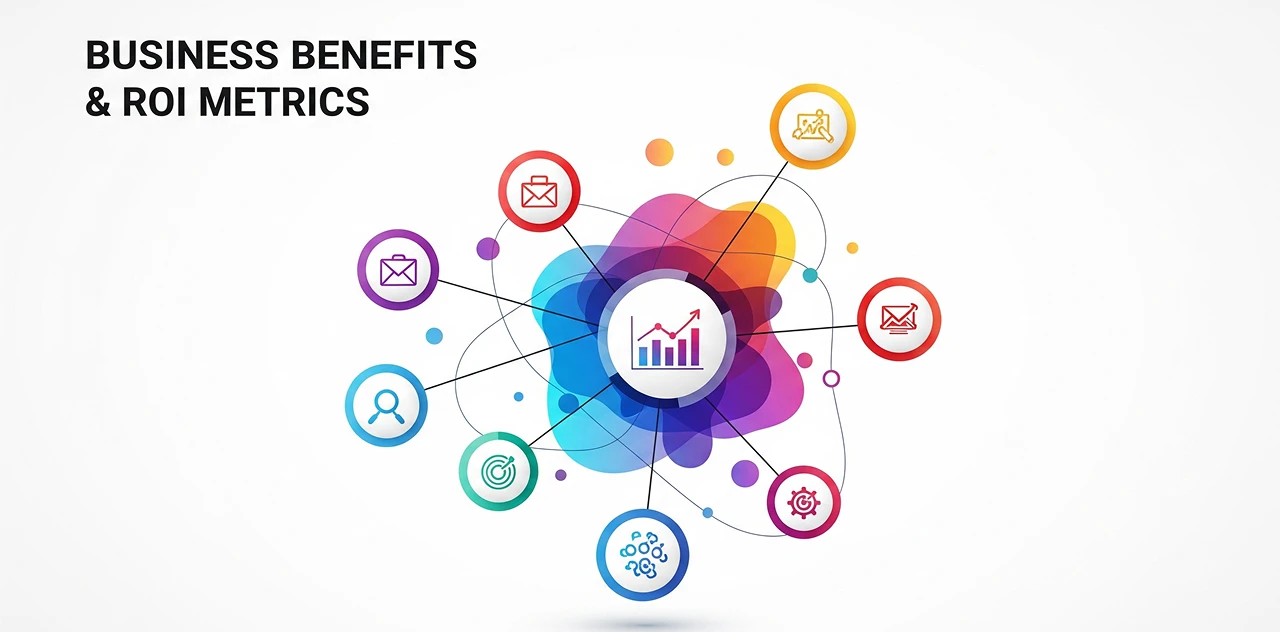
For retailers, SaaS providers, and product managers, autonomous commerce adoption translates into clear business ROI.
Adopting AI powered checkout systems and autonomous payment flows delivers clear advantages for merchants, while also providing measurable proof of value.
How ai-driven ecommerce drives ROI and measurable results with ecom AI agents:
Boosted conversions & larger baskets
Frictionless checkout and auto filled details lower abandonment, while intelligent upselling drives higher average order values.
Higher approval success
Smart routing, network tokens, and adaptive retries reduce false declines and maximize transaction success across issuers. (Track: Authorization rates by card/network).
Lower fraud losses & disputes
Biometric verification, passkeys, and device level signals block fraudulent attempts early. (Track: Fraud-to-sales ratio, chargeback rates).
Speed at checkout
Intent to confirmation happens in seconds, thanks to real time orchestration and tokenized payments. (Track: Average checkout completion time).
Unified omnichannel journeys
Web, mobile apps, chatbots, and voice channels all follow the same payment logic ensuring seamless customer experiences.
Reduced support overhead
Transparent consent trails and automated dispute handling free up teams from manual case management. (Track: Support cases per 1,000 transactions).
Increased loyalty & repeat purchases
Personalized recommendations and trust-first governance encourage customers to come back more often. (Track: Customer lifetime value, repeat order rates).
Clear proof vs. legacy systems
Side by side testing of agent led vs. traditional checkout demonstrates measurable gains in efficiency, revenue, and satisfaction.
👉 In short, autonomous shopping ecosystems give product teams the tools to increase revenue, improve payment reliability, and build long term customer trust, all while reducing operational complexity.
Job Market & Workforce Impact of Autonomous Commerce
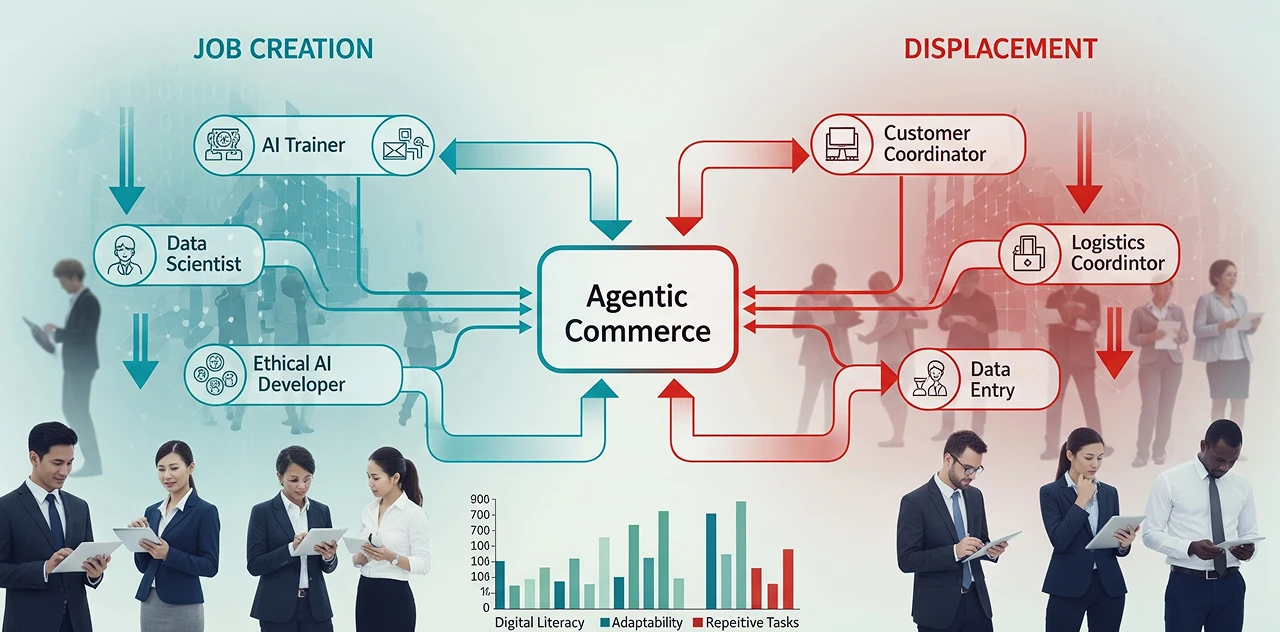
The rise of the agentic ecomwill inevitably reshape the job market and workforce dynamics. As autonomous intelligent agents handle tasks like fraud detection, product discovery, and autonomous checkout flows, certain manual or repetitive roles in customer service, payments processing, and ecommerce operations may decline.
At the same time, new opportunities will emerge in areas like:
- AI governance & compliance – ensuring transparency, data privacy, and ethical AI adoption.
- Commerce agent development – building, training, and scaling multi-agent systems.
- Data engineering & RAG powered knowledge graphs – structuring product catalogs and enabling AI-native personalization.
- Human–AI collaboration roles – where employees supervise, fine tune, and guide AI driven shopping assistants.
For businesses, this means reskilling workforces and adopting a human in the loop approach to balance automation with human oversight. Far from eliminating jobs, ai-driven online stores redistribute them toward higher value, AI augmented roles, preparing organizations for a more resilient and competitive digital economy.
Industry Adoption: Real-World Developments & Case Studies
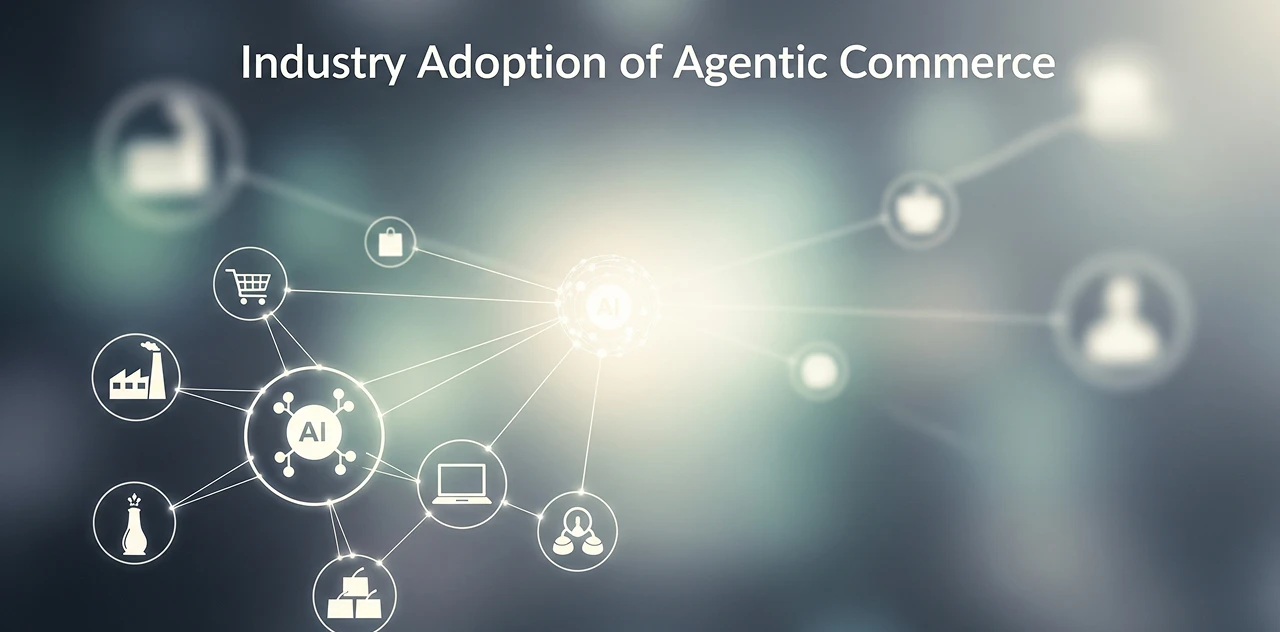
Amazon Shopping App – Buy for Me
Amazon leads the charge in agentic commerce by embedding AI shopping copilots into its ecosystem. Through the Buy for Me feature in the Amazon Shopping App, customers enjoy frictionless shopping ecosystems, in-app checkout, and data privacy safeguards. These buy for me retail AI payment agents detect fraud, personalize recommendations, and simplify checkout flows, ensuring trust, transparency, and convenience at scale.
Business impact: Business impact: Boosts brand exposure, AI agents handling checkout process reduces friction, and increases conversion rates with AI driven hyper personalized shopping journeys, while preserving data privacy and trust.
Visa & Mastercard with OpenAI - Agentic Payments
Visa and Mastercard are collaborating with OpenAI to build secure-tokenized payment rails for autonomous AI agents in ecommerce payments. With innovations like Visa Payment Passkeys, biometric safeguards, fraud protection for bot run payments, and bank grade governance tools, they are setting new benchmarks for governed AI execution in financial transactions.
Business impact: Business impact: Strengthens digital trust, reduces fraud related losses, and enhances payment ecosystem resilience through governed AI execution and secure tokenized commerce.
Perplexity AI Integration - One Click Shopping
Perplexity integrates agent aware product visibility and transparent processes to create one click shopping experiences and real time orchestration. By partnering with PayPal for payments, Perplexity highlights how commerce agents work like a self-driving car, making real time purchasing decisions with trusted, multi source data.
Business impact: Improves customer experience with one click shopping, reduces decision fatigue, and drives competitive advantage through transparent, agent aware commerce.
Shopify - Compliance & Checkout Simplified
Shopify enables AI shopping agents to manage checkout, compliance, and merchant customizations seamlessly. Its composable commerce infrastructure supports autonomous agents in handling subscriptions, bundles, and machine readable catalogs, without requiring replatforming.
Business impact: Cuts operational costs, accelerates adoption of AI native commerce journeys, and ensures enterprise grade compliance with GDPR, CCPA, and PCI DSS v4.
PayPal - Intelligent Fraud Detection & Seamless Transactions
Paypal announces agentic commerce initiatives and integrates autonomous AI solutions to process payments via platforms like Perplexity AI engine merging consumer consent and control with convenience.
Its autonomous payment agents monitor transactions in real time, using algorithmic risk detection and privacy preserving data models to reduce fraud.
Customers benefit from adaptive fulfillment and zero click shopping experiences with enhanced security.
Business impact: Builds consumer trust, supports multi channel autonomous execution, and enhances security with real-time fraud detection and privacy preserving data models.
Stripe – AI-Driven Orchestration & Operational Efficiency
Stripe deploys multi agent systems and reinforcement learning pricing models to power operational agility and real-time orchestration. By combining dynamic pricing strategies with governed AI execution, Stripe ensures higher approval rates, lower dispute ratios, and scalable agentic operations for merchants worldwide.
Business impact: Boosts revenue with higher approval rates, reduces chargebacks via predictive fraud prevention, and lowers costs through AI native checkout automation, scaling ai-driven ecommerce globally.
These real world deployments show that AI powered consumer spending forecasts are no longer predictions, they’re active market shifts reshaping ecommerce marketplace solutions and multi vendor marketplace management software. Businesses that move now will lead the new buyer economy.
Adoption is accelerating fast with generative search optimization (GEO), voice over screen shopping, and retrieval augmented generation (RAG) with knowledge graphs. Studies reveal 72% of consumers are open to AI led research and price comparisons, while 20–30% of PayPal users may soon transact via autonomous shopping.
Companies embedding AI Hubs, MCP frameworks, and tokenization systems will gain higher approval rates, build trust first governance, and future proof their commerce models against pricing pressures.
Real-World Agentic Prompts in Action

Here’s how AI shopping agents are already reshaping purchases across industries:
- “Find me the best noise canceling headphones under $300 and order today.” → Consumer electronics discovery made effortless.
- “Book a 4-star hotel in Paris near the Eiffel Tower for under $200/night.” → Hyper-personalized travel booking in seconds.
- “Order my monthly groceries from the cheapest retailer with same day delivery.” → Recurring ecommerce purchases, fully automated.
- “Renew our office printer supplies at the lowest negotiated rate.” → B2B procurement workflows streamlined.
- “Buy a lightweight laptop with at least 16GB RAM and fastest delivery option.” → High consideration purchases simplified.
👉 These examples prove the shift from assisted shopping to autonomous agent-led commerce is not futuristic, it’s happening now. Ecommerce businesses that adapt early will capture both consumer trust and market share.
Enhancing Security in Agentic Commerce with AI Payment Agents
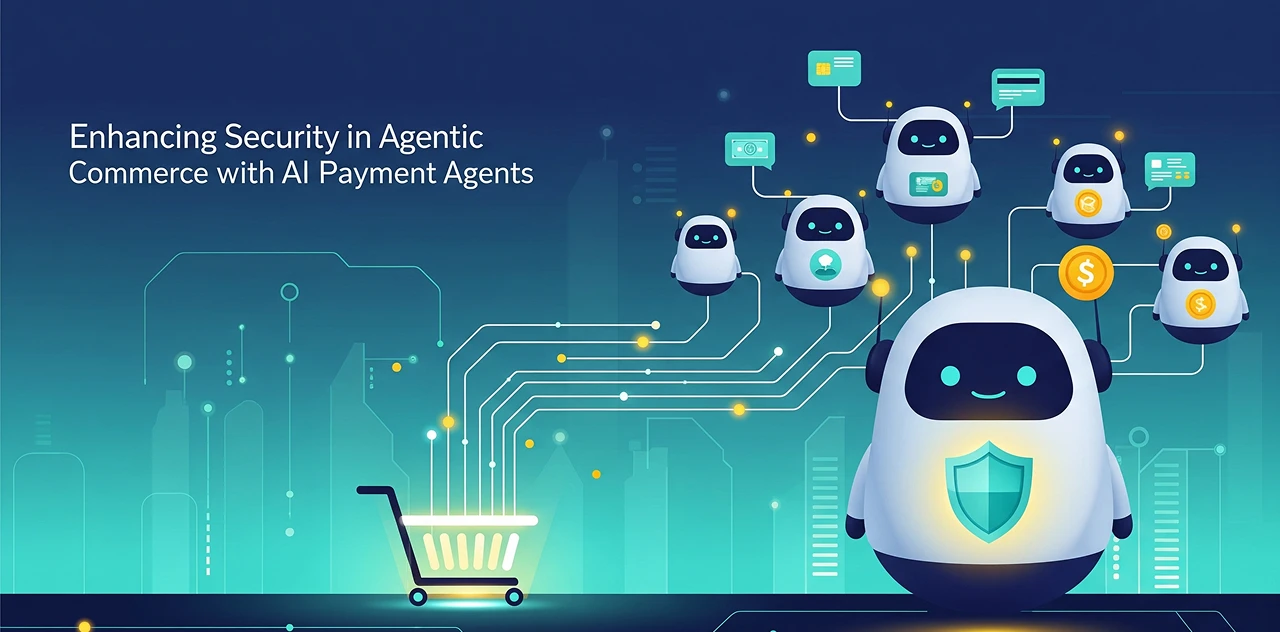
Security has always been the backbone of digital transactions, but in the era of autonomous commerce, the stakes are higher than ever. As consumers delegate purchases to intelligent agents, businesses must guarantee fraud prevention, trust, and seamless security at every step. This is where AI payment agents become essential, redefining how online shopping is protected.
Fraud Detection with Machine Learning
Traditional fraud prevention relies on static rules, which are easy for cybercriminals to outsmart. In contrast, AI powered fraud detection leverages machine learning algorithms to analyze patterns across millions of transactions. These autonomous AI agents identify anomalies in real time, adapting instantly to new fraud strategies. Instead of playing catch up, businesses can stay ahead, ensuring fraud prevention in ai-driven ecommerce is proactive, not reactive.
Biometric Authentication for Trust and Accuracy
Passwords and PINs are no longer enough. AI payment agents integrate with biometric authentication systems, such as fingerprint scanning, voice recognition, or facial ID, to verify users with near perfect accuracy. This multi factor authentication not only reduces the risk of identity theft but also delivers a frictionless checkout experience. Consumers gain confidence knowing only they can authorize transactions, strengthening trust in AI enabled payments.
Data Encryption and Real-Time Breach Monitoring
No matter how advanced the technology, adoption hinges on ethics, trust, & data governance.
- Data privacy management and privacy preserving data models keep customer data secure.
- Algorithmic bias mitigation ensures fairness in AI driven product discovery.
- Transparent processes & authentication systems are essential to build consumer trust.
- Bank grade tools and guardrails, spending limits, and consumer consent and control ensure governed AI execution.
Brands must embrace governance and design ethics as commercial levers, ensuring that real world developments like paypal agentic commerce processing payments via Perplexity’s AI engine remain safe, scalable, and transparent.
Challenges and Risks to Navigate
Despite the promise, businesses must address:
- Challenges: data quality, consumer trust, security.
- Algorithmic bias mitigation for fairness.
- Operational & technical agility—because static systems are no longer sufficient.
- Competitive disruption navigation to avoid being outpaced by agile rivals.
With the right guardrails—tokenization, transparency, governance, and human aware oversight, these risks can be managed.
The Business Imperatives: Why Enterprises Must Act Now
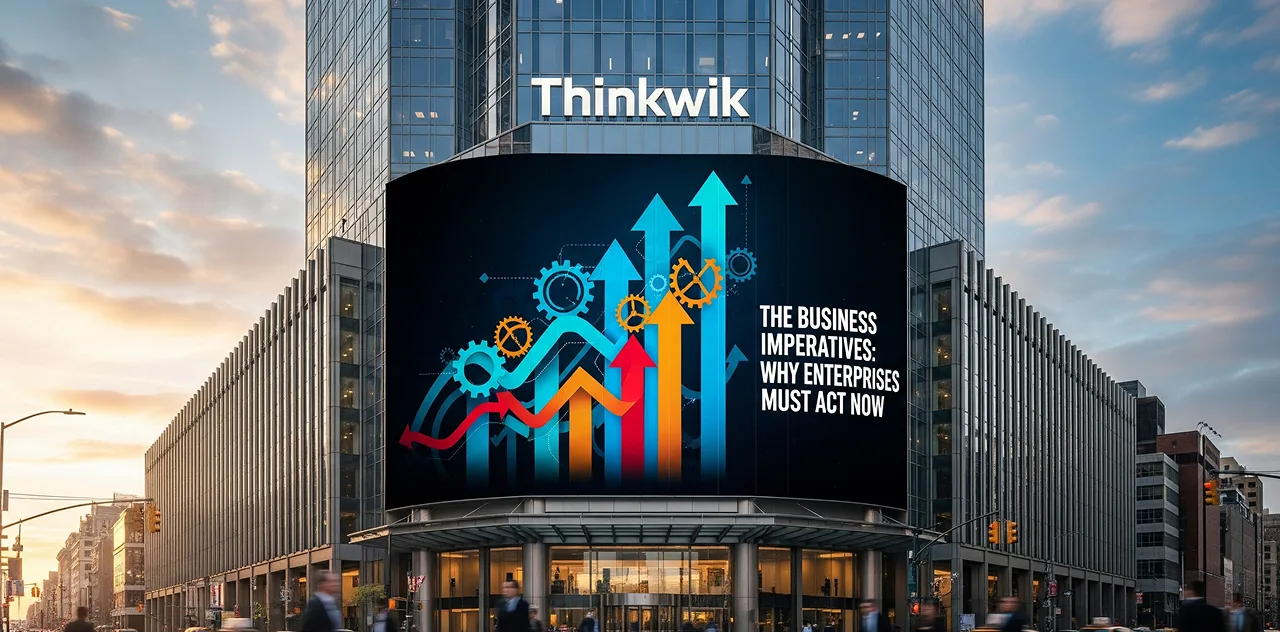
For enterprises, the urgency to act now is undeniable. Studies forecast AI powering consumer spending within five years, with 20-30% of PayPal users expected to start shopping through intelligent agents. Already, 64% of consumers are open to AI completing purchases.
The business strategy imperatives include:
Reassessing channels and value propositions in a new shopping paradigm where agent preference becomes the new competitive gatekeeper.
Building consumer purchase infrastructure optimized for purchasing agents through API integration across Mastercard, Visa, Stripe, PayPal, and AI-driven systems.
Preparing for competitive disruption navigation and disintermediation risk as agents parsing structured product data reduce direct consumer influence on storefronts.
Leveraging dynamic pricing strategies, reinforcement learning based pricing models, and swarm intelligence to stay ahead of race to the bottom pricing pressures.
Failure to adapt risks losing visibility in agent-aware product discovery, where agents influencing purchasing drive consumer behavior.
Why Is There an Urgency to Act Now?
We are at the tipping point.
- Studies predict AI powering $690B in UK consumer spending within five years.
- 72% of consumers use AI tools, but only 24% feel comfortable letting AI complete purchases.
- Yet 20-30% of PayPal users are expected to shop via intelligent agents within five years.
This shows an urgency to act now. Businesses that delay risk:
- Disintermediation risk where agents bypass storefronts.
- Loss of direct consumer influence due to agent preference as the new competitive gatekeeper.
- Race to the bottom pricing pressures as agents compare across multiple vendors.
Forward-thinking companies are already testing agentic marketplace simulations, embedding agent-aware product visibility, and preparing their consumer purchase infrastructure optimized for purchasing agents.
Strategic Guidance for Businesses
If you’re a brand, retailer, or enterprise leader, here’s how to prepare:
- Be transparent – Build trust through authentication and clear policies.
- Focus on meaningful convenience and savings – Not just flashy AI features.
- Offer user control – Spending limits, guardrails, and opt-ins.
- Start small – Low risk purchases, then scale to higher value transactions.
- Define roles in the agentic ecosystem – Proprietary vs discoverable experiences.
- Invest in data readiness – Structured product data, metadata, and machine-readable catalogs.
- Embed AI hubs – Centralized orchestration for scalable AI-powered operations.
By acting now, business in ecommerce and online retailers can capture new buyers, unlock operational efficiency, and future-proof against competitive disruption.
Autonomous AI assistants in Agentic Commerce powered by technologies like
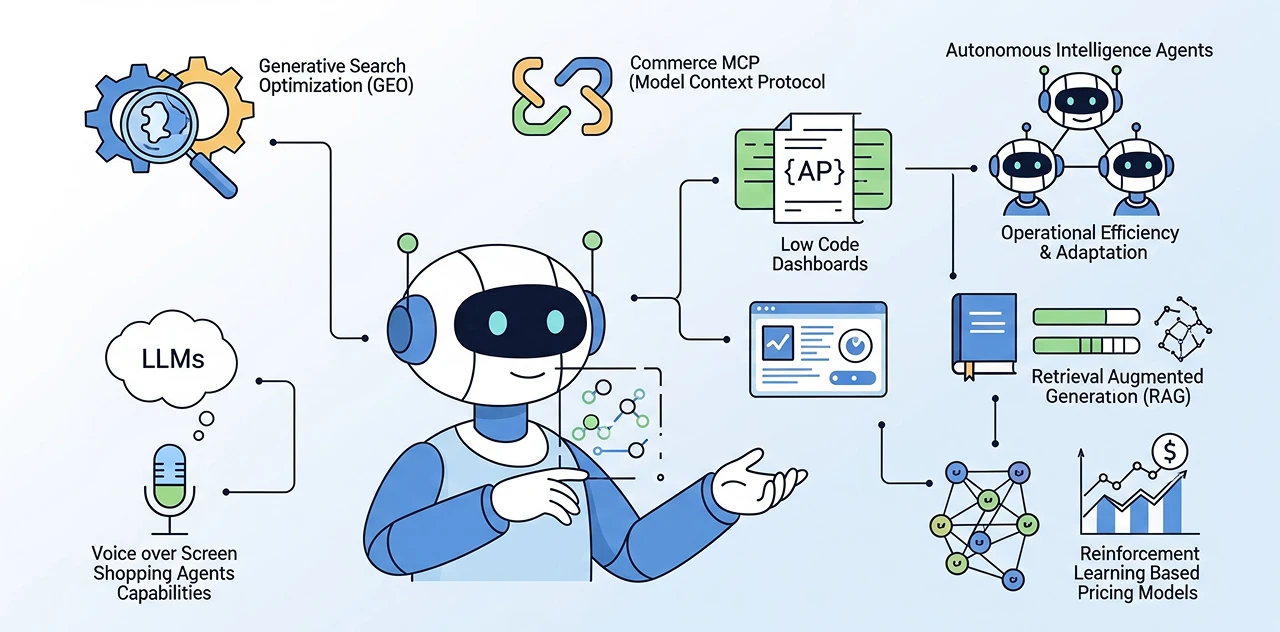
The rise of ai-driven commerce introduces massive technology & ecosystem shifts:
- Generative search optimisation (GEO) – Reshaping AI-native shopping experiences.
- LLMs – Enabling shoppable experiences via Perplexity, ChatGPT, Microsoft merchant program.
- Voice over screen shopping agents – Enabling conversational commerce.
- Commerce MCP (Model Context Protocol) – Enabling developer MCP essentials for agent-aware APIs and connecting agentic execution to existing infrastructure without replatforming.
- API integration – Across Mastercard, Visa, Stripe, PayPal, and autonomous systems.
- Low code dashboards – For business teams to adapt pricing or launch flash sales instantly.
- Autonomous intelligence agents – Research, compare, purchase across multi-channel execution with zero-click shopping experiences.
- Operational efficiency & adaptation – Automating workflows like vendor onboarding, fulfillment, and dynamic pricing.
- Retrieval Augmented Generation (RAG) & knowledge graphs – For context-rich responses.
- Reinforcement learning based pricing models – For dynamic pricing strategies.
This core architecture of agents is composable by design and intelligent by default, supporting multi-channel execution across websites, messaging apps (WhatsApp, Slack, CRM, mobile apps), and even AI native shopping experiences within Microsoft Copilot.
Brands can now deploy AI powered business user experiences via low code dashboards, AI enhanced brand journeys, and merchandising agents that dynamically bundle products, optimize layouts, and execute real-time product data orchestration.
In short, intelligent agents don’t just recommend; they make smarter decisions, ensure safer automation, and handle the real-time orchestration of commerce flows.
Adoption Blueprint: How Businesses Can Implement Agentic Commerce
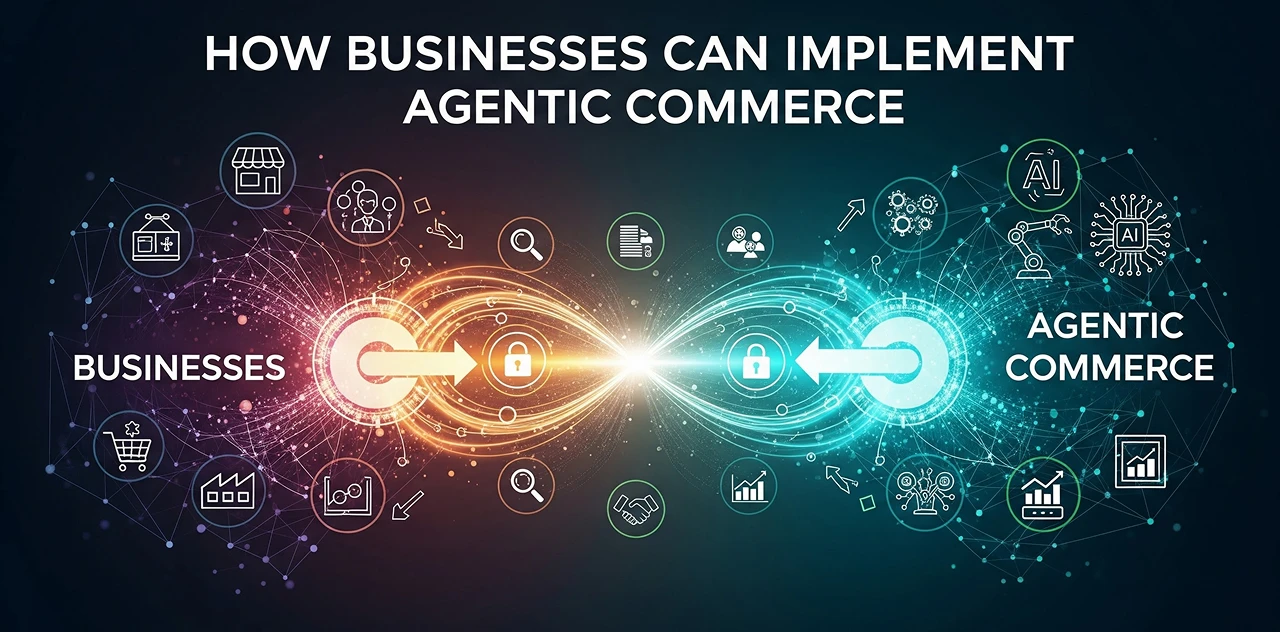
Adopting agentic commerce doesn’t require a full system rebuild, it’s about layering AI capabilities into existing digital ecosystems. Here’s a practical roadmap:
- 🛒 E-commerce Platforms → Deploy AI-driven checkout flows, cartless zero-click shopping, and personalized upselling to boost conversion rates.
- 📱 FinTech Apps → Secure customer trust with tokenized card storage, digital wallets, and biometric authentication powered by AI payment agents.
- 🏬 Retail & SaaS → Automate subscription billing, renewals, and usage-based pricing through agent-led payment orchestration.
- ☁️ Integration Layer → Connect APIs, cloud-native platforms, and mobile apps to unify customer data, enabling multi-agent commerce journeys across channels.
- ✈️ Travel & Hospitality → The agent books rooms or flights within spend caps, stores preferences, and triggers one-tap approvals.
👉 Want to make your platform ai-driven ecommerce ready? At Thinkwik, we help enterprises integrate AI, mobile, and cloud solutions that scale seamlessly, from proof of concept to global deployment.
Strategic Guidance for Businesses Entering the Era of Agentic AI Commerce
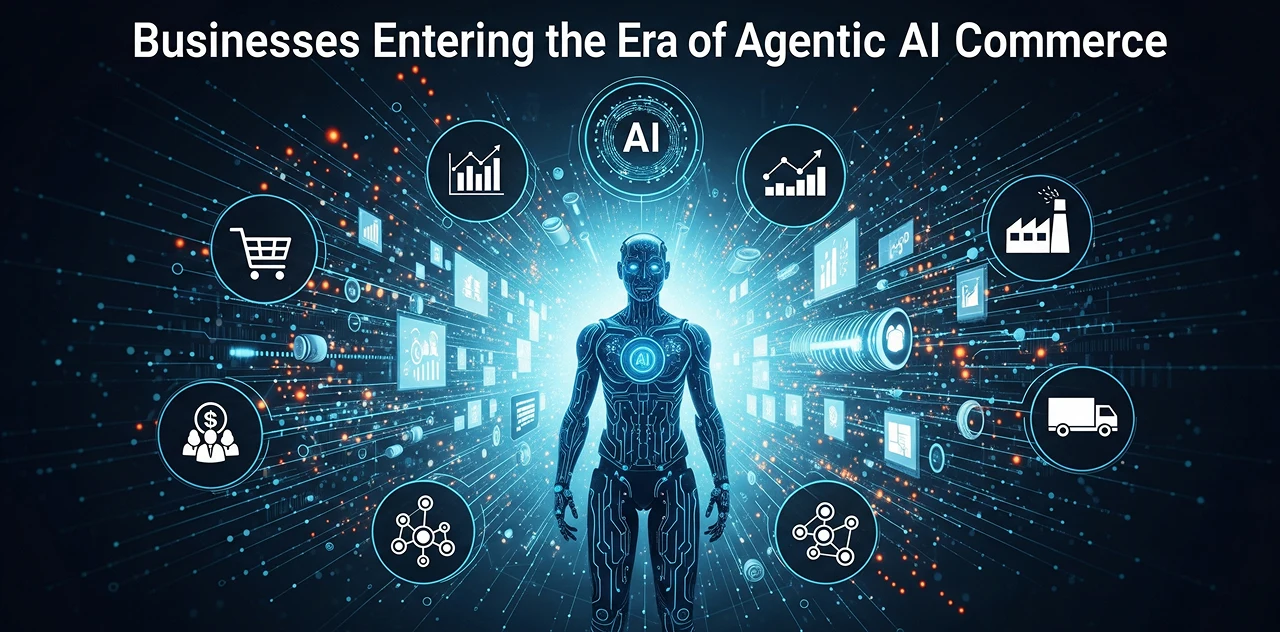
To succeed in the era of Autonomous AI ecommerce, enterprises should:
- Start small – Deploy low-risk, low-ticket AI-enabled transactions before scaling.
- Be transparent – Communicate data privacy, governance, and consumer consent clearly.
- Focus on meaningful convenience and savings – Deliver personalized purchase journeys and reduce decision fatigue.
- Define roles in the agentic ecosystem – Balance between proprietary vs. discoverable experiences.
- Build scalable agentic operations with AI Hub – Ensuring built-in governance, scopes, and auditing.
The Road Ahead: Next-Gen Commerce
The future is clear: Autonomous commerce is positioned as the next next phase of generative AI for online businesses.
Imagine a world where AI shopping agents:
- Filter hundreds of SKUs in seconds,
- Negotiate with vendors using reinforcement learning pricing,
- Deliver hyper personalized, high converting shopping experiences,
- Operate across a unified commerce ecosystem, blending digital and physical channels seamlessly.
This is not just next gen commerce, it’s agentic commerce for online retailers, revolutionizing how brands compete in an AI-driven shopping world.
Future Forecast: Agentic Commerce 2025–2030
The next five years will see:
- Full embedding of AI in purchase journeys.
- AI intelligent agents as standard in e-commerce.
- B2B procurement transformation with agents managing repetitive, complex workflows.
- Consumer purchase infrastructure optimized for purchasing agents.
- Unified commerce across digital and physical channels.
In other words, autonomous commerce is not optional, it’s inevitable.
💡 Final Thought
Autonomous commerce is more than a buzzword, it’s a new shopping paradigm redefining how consumers interact with brands. With AI intelligent agents, dynamic pricing strategies, governed AI execution, and hyper personalized shopping journeys, the future of commerce is shifting from assisted browsing to full shopping delegation.
The new buyer will expect AI powered personal shoppers who never sleep, seamless agentic checkout flows, and trust-first governance at every touchpoint.
Businesses that act now, embedding AI Hubs, ensuring transparency and data privacy, and embracing technology & ecosystem shifts, won’t survive this disruption; they’ll lead it.
👉 Is your business ready to harness Intelligent Agents, optimize for agent aware product visibility, and lead in the next revolution in online shopping with AI?
Don’t get left behind in the era of autonomous shopping.
From AI agents and governed orchestration to scalable multi agent systems, Thinkwik helps enterprises lead the next revolution in AI powered commerce.
👉 Book a strategy call today and let’s design your roadmap to agentic commerce leadership.
Frequently Asked Questions (FAQ) on Agentic Commerce
These companies are pioneers of agentic AI commerce:
- Amazon: AI-powered Buy for Me feature.
- Visa & Mastercard: Tokenized AI payment rails with OpenAI.
- PayPal: Fraud detection & zero click transactions.
They’re setting global standards for governed AI execution and secure payments.
- Governance & compliance (GDPR, CCPA, PCI DSS v4).
- Data privacy & transparency in AI led decisions.
- Integration complexity with legacy systems.
However, with the right adoption blueprint, these challenges become opportunities.
